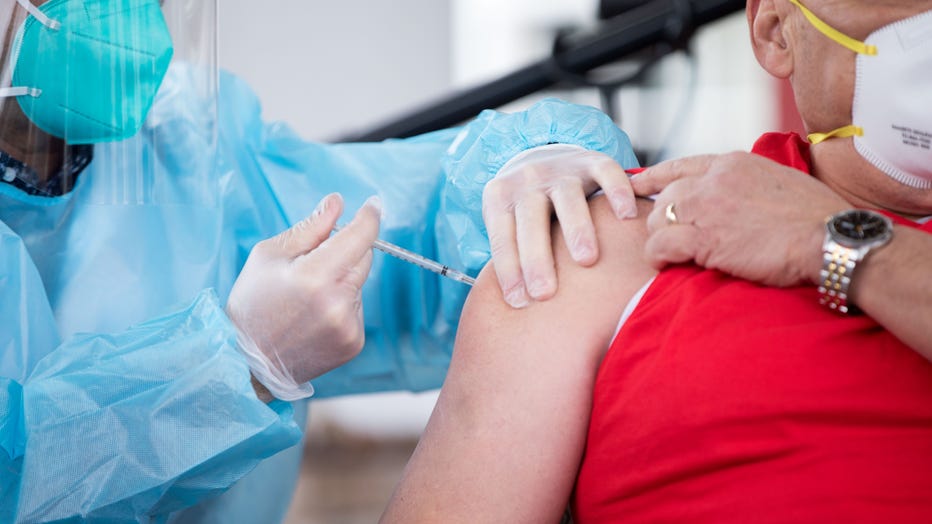CVS rolling out 250,000 COVID-19 vaccine doses to pharmacies in 11 states
CVS has announced it will be making its recently acquired 250,000 COVID-19 vaccine doses available to "eligible populations" in limited pharmacies across 11 states.
"Our presence in communities across the country makes us an ideal partner for administering vaccines in a safe, convenient, and familiar manner," said Karen S. Lynch, president and chief executive officer, CVS Health. "This is particularly true for underserved communities, which have been a focus for us throughout the pandemic."
The pharmacy chain said it sourced its COVID-19 vaccine supply directly from the federal government "through the pharmacy partnership program," according to a company news release.
CVS also noted that nearly half of the company’s 10,000 stores across the country are located in areas listed in the social vulnerability index as defined by the U.S. Centers for Disease Control and Prevention.
Several studies have revealed that the novel coronavirus has disproportionately affected people of color in the United States. In late January, the Biden administration reemphasized the importance of including "social vulnerability" in state vaccination plans — with race, ethnicity and the rural-urban divide at the forefront — and asked states to identify "pharmacy deserts" where getting shots into arms will be difficult.
The company will enlist licensed pharmacy technicians and nurses to help administer vaccines "giving CVS Pharmacy the capacity to administer 20 – 25 million shots per month," the news released stated.

FILE - CVS Health Vaccine Efforts at The Reservoir long term care facility on Friday, Dec. 18, 2020, in Hartford, Conn.
RELATED: Johnson & Johnson asks FDA to authorize its 1-dose COVID-19 vaccine
State-specific details (eligibility will be confirmed and communicated by states in advance of the rollout):
California: 81,900 doses
100 CVS stores
Connecticut: 6,800 doses
12 CVS stores
Hawaii: 4,400 doses
7 CVS stores
Maryland: 11,000 doses
18 CVS stores
Massachusetts: 21,600 doses
18 CVS stores
New Jersey: 19,900 doses
27 CVS stores
New York: 20,600 doses
32 CVS stores
Rhode Island: 3,400 doses
4 CVS stores
South Carolina: 15,300 doses
17 CVS stores
Texas: 38,000 doses
70 CVS stores
Virginia: 26,000 doses
28 CVS stores
The pharmacy also mentioned that it is working with both Ohio and Indiana to provide any additional vaccinations to residents, which is a separate operation from the "federal pharmacy partnership program but can run concurrently."
So far, CVS has administered the first round of COVID-19 vaccine doses to about 8,000 skilled nursing facilities and has more than 60% of the second doses completed.
"First doses at all long-term care facilities that selected CVS Health to provide COVID-19 vaccinations – more than 40,000 in total – will be complete by mid-February," according to CVS.
Meanwhile, coronavirus deaths in the U.S. surpassed 450,000 on Thursday, and daily deaths remain stubbornly high at more than 3,000 a day, despite falling infections and the arrival of multiple vaccines.
RELATED: Coronavirus variant P.1 surging in Brazil 'deeply worrying,' experts say
Infectious disease specialists expect deaths to start dropping soon after new cases hit a peak right around the beginning of the year. New COVID-19 deaths could ebb as early as next week, said the new director of the CDC.
Additionally, U.S. scientists have detected more than 500 cases of a variant first identified in Britain and expect it to become the cause of most of this country’s new infections in a matter of weeks. Another troubling variant tied to Brazil and a third discovered in South Africa were detected last week in the U.S. and also are expected to spread.
The British variant is more contagious and is believed to more deadly than the original, while the South Africa one may render the vaccines somewhat less effective. The ultimate fear is that a variant resistant to existing vaccines and treatments could eventually emerge.
Experts believe that the current vaccines circulating around the world are sufficient in fighting off a few of the new variants, however, if the need should arise, any of the mRNA vaccines, such as Pfizer or Moderna, can be retooled to protect against any mutated virus strains.
The Associated Press contributed to this report.


